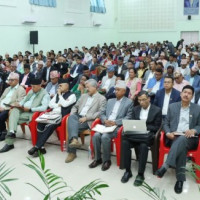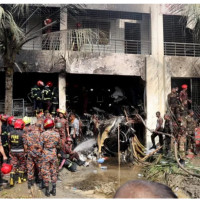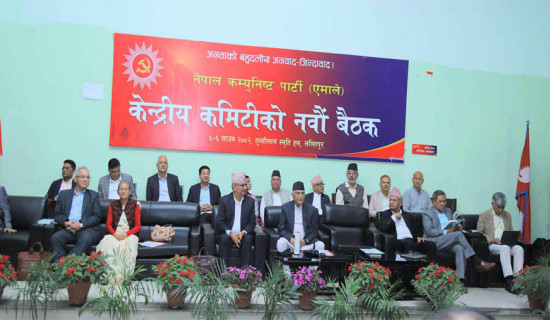- Tuesday, 22 July 2025
Who Really Won Israel-Iran War?
With a fragile ceasefire on the Israel-Iran war gradually taking shape, a key question remains – who actually won the 12-day devastating military confrontation? All three players – Iran, Israel and the United States of America – have claimed victory in the tumultuous war that has redefined the geopolitics of the Middle East. Despite its humongous losses of scientists, citizens and critical military infrastructure, Iran has displayed its rare military might and resiliency and emerged as a powerful nation, dwarfing all its neighbours and rich rivals in the region. Its retaliation against Israel with a hypersonic missile turned the latter’s strategic buildings and sites into rubble, scenes commonly seen in Gaza.
Of course, Israel has superior military strength compared to the isolationist Iran but its barrage of supersonic missiles pierced through the former’s defence system and destroyed Mossad headquarters, oil refinery, airport, Microsoft buildings and residential areas. Israel and its ally, the US, had underestimated Iran’s hidden military strength. As it came with a vengeance, it surprised all – how can an economically crippled nation inflict damage on Israel to such an extent.
Defiant Khamenei
It appears that Israel had underestimated its sworn enemy, Iran, which has been preparing for war with the former for decades. In his first comment following the truce, Iran’s supreme leader Ayatollah Ali Khamenei said that ‘with all that commotion and all those claims, the Zionist regime was practically knocked out and crushed under the blows of the Islamic Republic’. Stating that the US gained no achievements from the strikes on its nuclear facilities, Khamenei said that Iran would never surrender to the US and any future aggression would come at a great cost.
Following the ‘obliteration’ of three nuclear sites - Fordow, Natanz and Isfahan – Israeli Prime Minister Benjamin Netanyahu claimed his country had secured a "historic victory" against Iran. Although there are contested views on the extent of damage incurred to the nuclear sites, US President Donald Trump and Netanyahu share that Iran’s nuclear programme has been destroyed. A preliminary US intelligence report discloses that the US bombing set back Iran’s nuclear programme by just a few months, which Trump and his aides have outright rejected.
Israel, which started the war by attacking Iran on June 13, succeeded in dragging the US into the war, a primary objective of Netanyahu. Israel was unable to destroy these sites without the US’s help, which was its plan pending for three decades. It is also argued that Iran had already taken 400 kg of uranium, which has been enriched to 60 per cent, to safer locations. Fordow plant has advanced centrifuges that could enrich uranium up to 90 per cent, a threshold for preparing atomic bombs. However, Iranian regime has been insisting that it has no plan to get an atomic bomb but wants to use it for peaceful civilian purposes.
Netanyahu wanted the US, along with Israel, to continue to attack Iran and topple its regime. But the US disagreed and leapt to forge a ceasefire between the two warring nations after Iran's symbolic attack on the US air base in Qatar. US Vice President JD Vance has made it clear that his country was ‘not at war’ with Iran, but is with its nuclear weapons. Trump also took Netanyahu to task for violating the ceasefire. Under Trump, the US played a theatrical role from the very beginning of the air war. He changed his position several times, passing comments filled with bluff and bluster.
He first acted as a ‘bomber’ and then instantly became a peace-broker. Keeping the entire world in the dark, he ordered to smash the nuclear sites of Iran in the wee hours. Termed as Operation Midnight Hammer, the US used seven B-2 bombers and over two dozen Tomahawk cruise missiles. The nations with advanced military industries need wars to test the precision and capability of their warheads. This time, the US applied bunker buster Northrop B-2 Spirit stealth bombers, which, according to its retired pilot, were planned and designed 15 years ago, bearing in mind the very Fordow Uranium Enrichment Plant built beneath the rocky mountains.
This was also an occasion for the US to show military hubris and superiority. In his X account, Trump trumpeted, “There is not another military in the World that could have done.” The Western media hyped the US's strikes with the technical details of the B-2 bombers. In doing so, they paper over a grim reality – this had blatantly violated the sovereignty of Iran, the UN Charter and international law. The hypocritical posture of some Western nations also came to the fore. They have banded together to castigate Russia for invading Ukraine but supported the US in bombing the nuclear facilities of a sovereign nation.
Cooperation suspended
Meanwhile, Iran has suspended cooperation with the International Atomic Energy Agency (IAEA), citing that it failed to condemn the attack on the nuclear facilities and 'put its international credibility up for sale.' Their cooperation remains postponed until there is a security guarantee for its nuclear facilities. This move might further strain nuclear talks between Iran and the US, scheduled to start from next week, according to Trump. With his involvement in the Iran war, Trump has faced backlash at home, with the surges of mass protests and online trolling. Some senators have even demanded that he be impeached for his 'unconstitutional act'.
However, by striking a peace deal, Trump has saved the day. Media reports state that his administration is considering floating a $30 billion civilian-energy-producing nuclear programme for Iran in a bid to bring it back to the negotiating table. The US seeks to ease sanctions and free up Iran's frozen billions of dollars. But there is a strict condition: Iran must abandon the enrichment of uranium. Will Iran, wounded by the US and Israel, soon come to the nuclear talks? As the dust of battle has not fully settled, it will be premature to predict how the post-ceasefire scenario will unfold.
(The author is Deputy Executive Editor of this daily.)

















